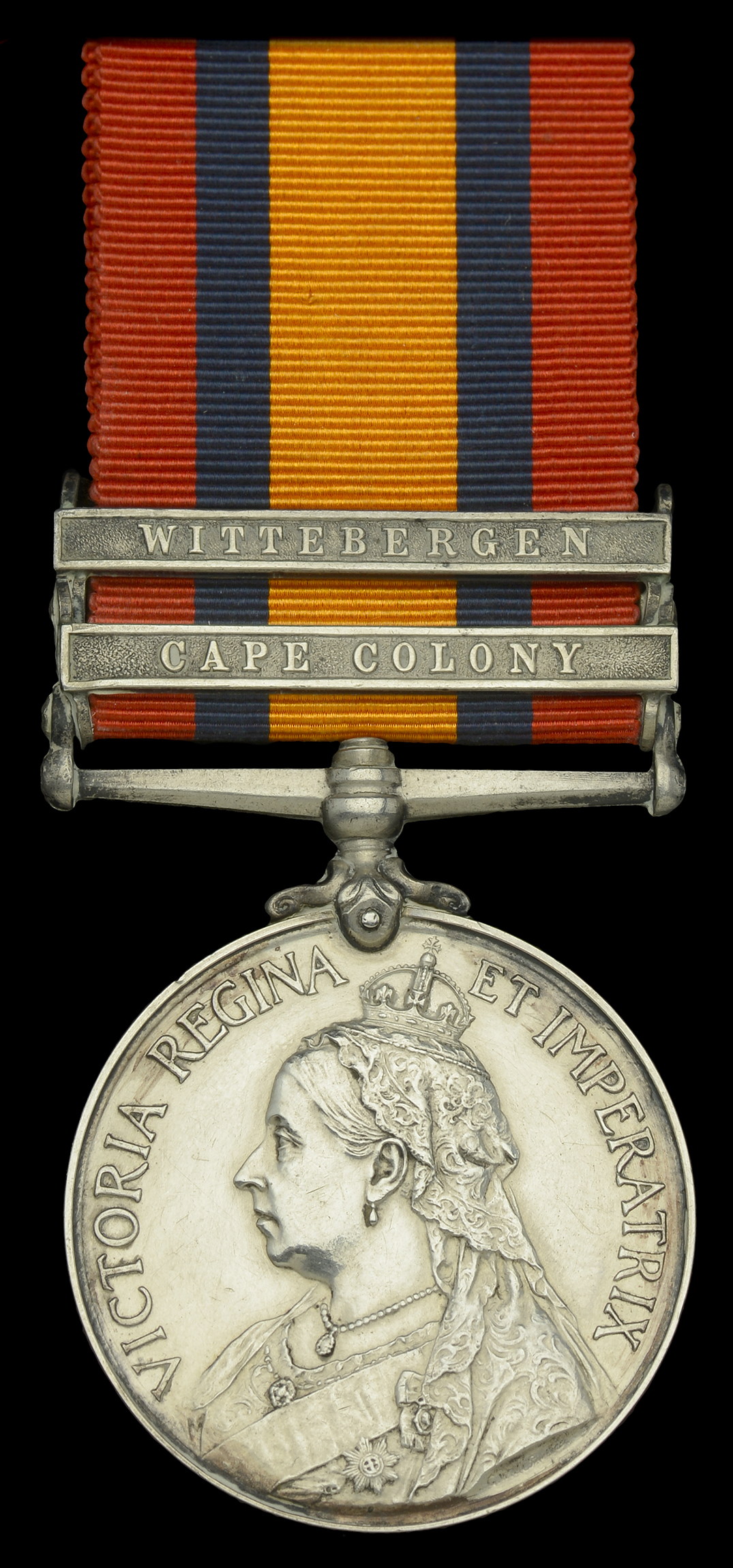A scarce Queen’s South Africa Medal awarded to Captain and Company Commander W. W. Stanley-Clarke, 2nd Company, 1st Battalion Imperial Yeomanry, who was killed in action at Brandwater Basin on 24 August 1900 Queen’s South Africa 1899-1902, 2 clasps, Cape Colony, Wittebergen (Capt. Stanley-Clarke. 2/Co 1/Imp. Yeo.) engraved naming, note lack of initials which were never added, extremely fine £1,600-£2,000 --- William Willoughby Stanley-Clarke was born in 1868, the eldest son of the late Colonel Stanley Clarke, 21st Hussars, and was educated at Cheltenham College. At the outbreak of the Boer War he was engaged in tea-planting in Ceylon, but volunteered for active service; his services were accepted and he was granted the rank of Captain in the army from 10 March 1900, and joined the Imperial Yeomanry from the 6th Battalion, Worcestershire Regiment, in which he had served as a Captain from August 1894. Captain Stanley-Clarke commanded No. 2 Company, 1st Battalion, Imperial Yeomanry from the forming of the battalion. The battalion consisting of 1st (Wiltshire) Company; 2nd (Wiltshire) Company, commanded by Captain Stanley Clarke; 3rd (Gloucestershire) Company; 4th (Glamorganshire) Company; and 63rd (Wiltshire) Company. The Battalion arrived at Cape Town on 23 and 30 March 1900 and were immediately sent up to the Imperial Yeomanry Base Camp at McKenzie Farm. On the 16 April orders were given for the battalions to move ‘up country’, with Captain Stanley Clarke’s No. 2 Company being ordered to Springfontien. They were joined several days later by HQ and the balance of the Wiltshire’s. For the next few weeks, the Yeomanry were employed on escort and patrol duties, before joining General Rundle’s 8th Division on 4 May. At this time General Rundle was involved in preliminary movements by which he intended to surround Boer forces operating in the Eastern corner of the Free State, driving them briefly into the Brandwater Basin. On 5 May, No. 4 and No. 2 Company went into action for the first time, luckily having no casualties. Patrols continued for the next few weeks but on 25 May, elements of No. 2 Company were involved in an action at Senekal in which Major Dalbiac and a number of men from the Middlesex Yeomanry were killed and wounded. Men of No. 2 Company captured a Boer flag. By June, operations commenced to surround the Boer forces of 10,000 men under Generals De Wet, Prinsloo and Olivier, with the 1st Imperial Yeomanry being part of General Rundle’s own force which occupied a line between Ficksburg and Sekekal. According to the regimental history, ‘From this date until 25 July, the 1st Imperial Yeomanry was employed in escort and reconnaissance duty with the 8th Division, being daily under enemy fire, for the whole country was alive with scattered bands of the enemy.’ Small actions were taking place all along the lines, and during the months of June and July the Boers were being pushed back, though De Wet and his force managed to slip through the cordon. However, on 30 July 1900, General Martinus Prinsloo surrendered at Surrender Hill in the Brandwater Basin, and for the Yeomanry, the next month consisted of mopping up patrols and expeditions. On 24 August 1900, Captain Clarke went out on patrol with part of his company into the Brandwater Basin, where many of the Boers that escaped the surrender of Prinsloo were hiding out. The company formed part of a larger force of Leicester Imperial Yeomanry and Port Elizabeth Guards, under Captain Harrison of the Leicesters (all told around 200 men). Captain Clarke was sent off with a detachment to try and capture a force of Boers who had been reported to be at a farm in the mountains. At daybreak on 26 August, the farm was surrounded, but it was discovered that several more Boers were held up in a nearby cave. Captain Clarke and Lieutenant Barclay, with a number of men, attempted to enter the cave, but Captain Clarke was shot and killed and Lieutenant Barclay and a Private were wounded. On hearing the firing, Captain Harrison came up with the Leicesters, but in the confusion caused by the loss of the two Officers, most of the Boers managed to escape, leaving 1 dead and 17 captured. ‘The Last Post’ states Stanley Clarke was killed at Harrismith, which was under British control at the time, but the regimental history makes it clear that it was during the search for Boer stragglers in the Brandwater Basin (in which 1st Imperial Yeomanry were heavy involved) that the action took place. Captain Stanley Clarke’s name is inscribed on the Eleanor Cross War Memorial at Cheltenham College. ‘The Annals of the Yeomanry Cavalry of Wiltshire’ Vol 2 1893 – 1908, gives a detailed account of the formation of the raising of the Wiltshire companies, Imperial Yeomanry for service in the Boer War and their service during the War itself.


